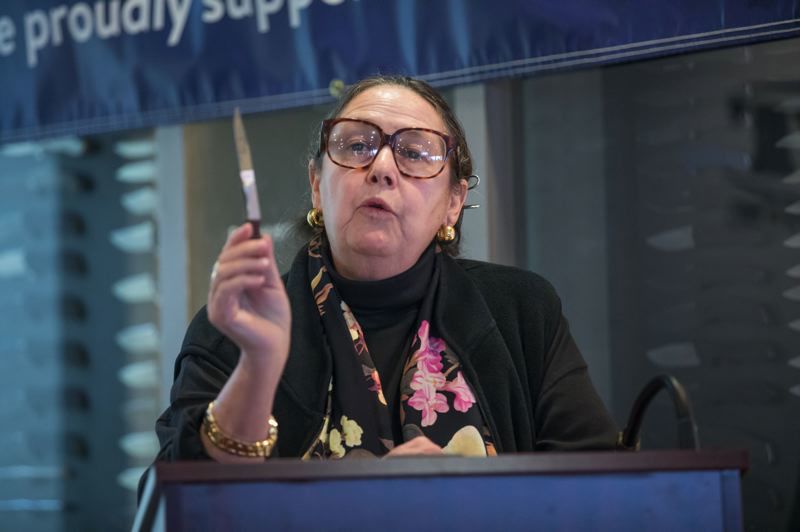Johnson submits petitions in insurgent bid for Oregon governor
Published 12:00 pm Tuesday, August 16, 2022

- PAMPLIN MEDIA GROUP FILE PHOTO - State Sen. Betsy Johnson of Scappoose
Oregon governor candidate Betsy Johnson submitted petitions to the Secretary of State on Tuesday to qualify her insurgent bid for governor in the Nov. 8 general election.
The campaign for Johnson, the former Democratic state senator from Columbia County, delivered boxes it said contained petitions with 48,214 signatures to Secretary of State Shemia Fagan at noon Tuesday.
The county by Johnson’s campaign would be twice the minimum number of valid signatures required and even with the usual attrition of invalid signers would be “well over the number necessary to qualify,” said Johnson campaign spokesperson Jennifer Sitton.
Democrat Tina Kotek and Republican Christine Drazan won their parties’ May 17 primaries and will also be on the ballot.
Fagan’s office is in the Public Services Building in Salem while the nearby Capitol undergoes extensive renovations.
Oregon Public Broadcasting reported Johnson made a brief appearance at the event, thanking supporters for the effort.
“Why did they do this?” she said. “They love Oregon. They want a better Oregon, free from partisan paralysis.”
OPB reported Johnson did not take questions from the press who had gathered to cover the petition drives’ ending. Tuesday was the deadline that Fagan had set to give her office enough time to validate the signatures by the Aug. 30 deadline to add Johnson to the November ballot.
The next step will be for Election Division officials to validate signatures by checking a random sampling sufficient to show any problems with the overall signature effort.
If Johnson were to win election, she would be only the second governor elected without a major party nomination. Julius Meier, an independent, was elected to one term in 1930.
Johnson (or Drazan) would be the first non-Democrat woman elected governor. Gov. Barbara Roberts was the state’s first woman elected governor, in 1990. She and Kate Brown, the current governor, are Democrats.
Tuesday will also mark a turning point for several major female politicians in western states.
U.S. Rep. Liz Cheney, R-Wy., will collide head-on with the wrath of followers of former President Donald Trump.
Cheney, the daughter of former Vice President Dick Cheney, is Wyoming’s sole member of the U.S. House. She was among 10 Republicans who voted to impeach Trump for his role in the Jan. 6, 2021 mob attack on the U.S. Capitol. She broke with her caucus to serve as a leader on the U.S. House investigation into the deadly riot.
A poll released last Thursday by the University of Wyoming’s Wyoming Survey and Analysis Center (WYSAC) showed 57% of 562 Wyoming residents surveyed preferred Trump-backed attorney Harriet Hageman to Cheney.
Also trying to join the Republican caucus on Tuesday is former Alaska Gov. Sarah Palin, the GOP vice-presidential running mate of the presidential nominee in 2008. The ticket lost to Democrats Barack Obama and Joe Biden.
Palin is seeking a political comeback in Tuesday’s special election to fill out the remainder of the term of Rep. Don Young, R-AK. At the time of his death in March, Young was the longest serving Republican in congressional history.
The winner would take office immediately, but serve only until the new Congress elected in November is sworn in next January.
Voters will simultaneously choose candidates in a primary for a full two-year term in the U.S. House. Palin is also a candidate in that vote.
Alaska has a one-of-a-kind open primary system in which all candidates are on the ballot regardless of party affiliation and the top four finishers go to the general election.
The November election in Alaska then uses a “ranked choice” system in which voters choose their first choice and then rank the other candidates in order of preference. Votes for the fourth-place finisher are then transferred to the next choice on each ballot until a winner is decided.
The Tuesday vote will decide the winner of the special election, though final results are not expected until the end of August due to Alaska’s extended mail voting deadline at the end of the month. The Tuesday election will also decide the four candidates who will be on the general election ballot in November.
The Alaska primary also includes the Senate primary in which U.S. Sen. Lisa Murkowski, R-AK, is seeking re-election despite opposition from Trump. Trump is backing Alaska Department of Administration Commissioner Kelly Tshibaka.
A longtime Republican maverick, Murkowski has her own strong base of support beyond the GOP base who support the former president.
As with the congressional race, the Tuesday vote will choose the four candidates who will appear on the ballot in November. A key indicator of a possible outcome in the general election is whether Murkowski or Tshibaka finishes first.





